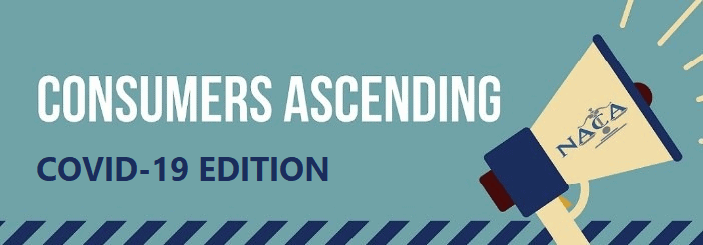
COVID-19 is not just a public health crisis, it’s a consumer crisis too. The pandemic has put the financial security of millions of households across the country in jeopardy as they grapple with unemployment, eviction, debt collection, and more. Here are some tips:
 Navigating Evictions
Navigating Evictions
Around 20 million Americans are at risk of eviction by the end of September 2020. Consumer attorneys advise that tenants who are afraid of losing their homes should take care to document all communications with their landlord and respond immediately if their landlord begins an action against them. It’s also important for renters to know their rights, what special protections may be available to them, and when those protections expire.
Click here for more on Navigating Evictions.
 Grappling with Aggressive Debt Collection
Grappling with Aggressive Debt Collection
“Remember that even when you may be far behind on paying your debt, you still have legal rights and protections.” – Carla L. Sanchez-Adams, Texas RioGrande Legal Aid
Consumer debt and aggressive collection activities have been on the rise and COVID-19 has done little to slow them down. Fortunately, there are steps consumers can take to make sure they aren’t taken advantage of, even in the middle of a global pandemic.
Click here for more on Grappling with Aggressive Debt Collection.
 Managing Mortgages
Managing Mortgages
Mortgage delinquencies have hit a five-year high thanks to the pandemic. State and federal governments have put protections in place to help homeowners keep up with their mortgages and most servicers are offering relief options. But consumers should stay aware of what those options are and how they work. Attorneys advise homeowners to keep written records of all communications with their mortgage servicers in case anything goes wrong.
Click here for more on Managing Mortgages.
 Protecting Your Credit
Protecting Your Credit
Credit reporting problems have long been the leading source of consumer complaints to the Consumer Financial Protection Bureau. Now, as millions of households continue to struggle to make ends meet and many creditors are offering payment accommodation programs, consumers are more likely than ever to experience issues with their credit reports, which can lead to long-term difficulty obtaining housing, employment, insurance, and other necessities. There are steps consumers can take now to stay on top of and protect their credit.
Click here for more on Protecting Your Credit.
 Protecting Against Repossession
Protecting Against Repossession
Many Americans rely on cars to get to work and school, and carry out other essential functions. It is especially important now, during this continued period of economic instability, that consumers stay on top of their auto loans. Consumers who believe they could be facing repossession should act early to keep their access to their vehicles.
Click here for more on Protecting Against Repossession.
NACA's
Practice Areas
Browse Our
Attorney Directory
Press Inquiries
For press inquiries, contact Ira Rheingold.
To be added to our press/media mailing list, please contact Christine Hines.

